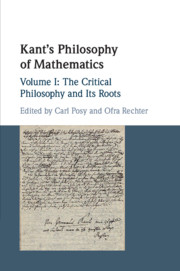Book contents
- Kant’s Philosophy of Mathematics
- Kant’s Philosophy of Mathematics
- Copyright page
- Dedication
- Contents
- Contributors
- Acknowledgements
- Introduction
- Part I Roots
- Part II Method and Logic
- Part III Space and Geometry
- 7 Kant on Parallel Lines
- 8 Continuity, Constructibility, and Intuitivity
- 9 Space and Geometry in the B Deduction
- Part IV Arithmetic and Number
- References to Works by Kant
- Bibliography
- Index
7 - Kant on Parallel Lines
Definitions, Postulates, and Axioms
from Part III - Space and Geometry
Published online by Cambridge University Press: 24 April 2020
- Kant’s Philosophy of Mathematics
- Kant’s Philosophy of Mathematics
- Copyright page
- Dedication
- Contents
- Contributors
- Acknowledgements
- Introduction
- Part I Roots
- Part II Method and Logic
- Part III Space and Geometry
- 7 Kant on Parallel Lines
- 8 Continuity, Constructibility, and Intuitivity
- 9 Space and Geometry in the B Deduction
- Part IV Arithmetic and Number
- References to Works by Kant
- Bibliography
- Index
Summary
By the turn of the twentieth century, many philosophers claimed that Kant’s philosophy of mathematics (and, indeed, his entire philosophy) was undermined by the real possibility of geometries in which Euclid’s axiom of parallels is false. It is surprisingly not well known that Kant – though never discussing parallel lines in his published work – did write a series of unpublished notes on the philosophical problems posed by parallel lines. This paper presents the argument and chief issues of these notes. Kant’s main point in these notes is that neither Euclid’s definition of parallel lines, nor the alternative definition proposed by Leibniz and Christian Wolff, fulfills the requirements on mathematical definitions that Kant explicates in the Critique of Pure Reason. Thus, these notes show that Kant did reflect on the problems posed by the theory of parallel lines and recognized that it was uniquely problematic. Moreover, Kant’s reflections yield new insights about his philosophy of mathematics. In particular, Kant’s attitude toward the theory of parallels demonstrates that he had a novel theory of mathematical definitions, axioms, and postulates – a theory that Kant’s contemporary readers have largely misunderstood.
Keywords
- Type
- Chapter
- Information
- Kant's Philosophy of Mathematics , pp. 157 - 180Publisher: Cambridge University PressPrint publication year: 2020



